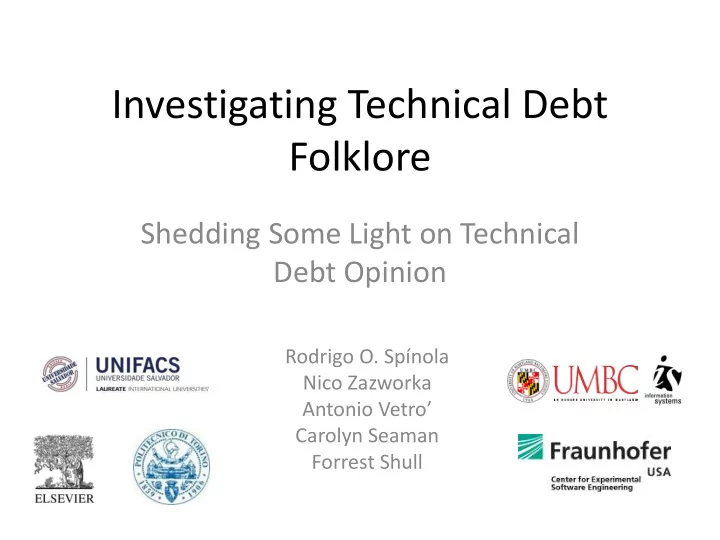

Investigating Technical Debt Folklore Shedding Some Light on Technical Debt Opinion Rodrigo O. Spínola Nico Zazworka Antonio Vetro’ Carolyn Seaman Forrest Shull
Abstract • A study focused on folklore statements about Our rationale is that if any folklore is either widely agreed to or Technical Debt widely disagreed with by a large group of knowledgeable people, then those propositions are more likely to be good candidates for • Surveyed software practitioners on their future research. agreement with each folklore statement …traditional stories, beliefs, and customs of a group of people... • Results revealed that there is some consensus Folklore can sometimes hide valuable information originating • Results also provide some evidence and from people’s experience that, if evaluated, could contribute motivation for exploring some open issues in positively to the study of the area. TD research • Contribution to the Technical Debt Landscape. MTD 2013 - San Francisco 2
Research Goal and Questions • Goal: identify and understand what folklore, at this moment, seems to make sense and constitute good candidates for more detailed investigation • Research Questions: – Tendency: With which folklore statements did participants agree or disagree? – Consensus: How strong is the consensus on each of the folklore statements? MTD 2013 - San Francisco 3
Study Procedure • Two phases – 1: Identifying TD Folklore Statements • search was performed on online websites, blogs, and published papers • looked for any statement that might be subject to opinion, or that might be a good candidate for further investigation • 14 potential TD folklore statements were selected MTD 2013 - San Francisco 4
Study Procedure • Two phases – 2: Evaluating TD Folklore Statements • Online Survey + Paper Survey • Participants were invited to indicate their level of agreement for each of TD folklore statements 1: strongly disagree” “5: strongly agree (paper survey – 6: I don’t know) • 37 subjects answered the survey • Compared the results MTD 2013 - San Francisco 5
Results and Discussion • #2 - Technical debt usually comes from short-term optimizations of time without regard to the long-term effects of the change. • High disagreement with the statement that • #4 - Working off debt” can be motivational and good for team morale. “All Technical Debt is intentional” • #8 - If technical debt is not managed effectively, maintenance costs will increase at a rate that will eventually outrun the value it delivers to – This strongly supports the ongoing line of research customers. into tools that analyze source code for “hidden” • #12 - Technical debt should not be avoided, but managed. and unknown debt. • #13 - Not all technical debt is bad. • Statements #2, #4, #8, #12 and #13 received general agreement and high to medium consensus – which suggests that these are good candidates for further scientific studies MTD 2013 - San Francisco 6
Results and Discussion • Mixed answers (no agreement or disagreement) #1 - Accruing technical debt is unavoidable on any non-trivial software project • #3 - It is very difficult for software developers to see the true effect of the technical debt they are • incurring. #5 - The root cause of most technical debt is pressure from the customer. • #6 - Unintentional debt is much more problematic than intentional debt. • #7 - The individuals choosing to incur technical debt are usually different from those responsible for • servicing the debt. #9 - No matter what, the cost of fixing technical debt increases the longer it remains in the system. • #10 - Paying off technical debt doesn’t result in anything the customers or users will see. • #11 - The biggest problem with technical debt is not its impact on value or earnings, but its impact on • predictability. • This indicate that the statement is not commonly believed, depends on many factors, or that the statement itself is not yet formulated as precisely as needed. MTD 2013 - San Francisco 7
Summary • A study investigating TD “folklore” • The authors compiled a list of 14 folklore statements • We tested the consensus by surveying software practitioners on their agreement with each folklore statement MTD 2013 - San Francisco 8
Conclusion • The results provide some evidence and motivation for exploring the following issues in TD research: – Methods and tools for finding unintentional, and therefore likely hidden, TD in source code and other artifacts – Methods and techniques for managing and tracking TD – Investigation of the “sweet spot” between an acceptable and healthy level of debt, and a level that is approaching dangerous – The relationship between TD and team morale and motivation – Exploring the differences, in both cause and effect, between intentional and unintentional TD MTD 2013 - San Francisco 9
THANK YOU! Questions? MTD 2013 - San Francisco 10
Recommend
More recommend